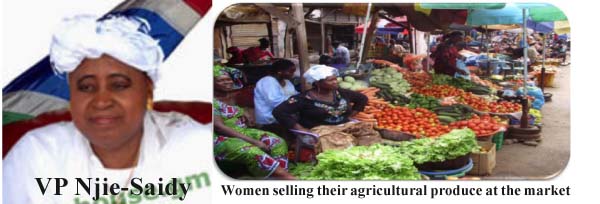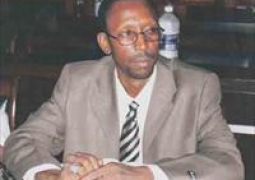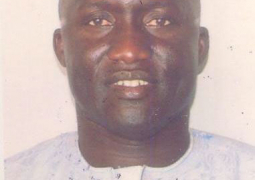
Delivering her statement, VP Njie-Saidy said: “In The Gambia, we will commemorate International Women’s Day, recognizing the laudable achievements and socio-economic advancement of our women. We will further reflect on the challenges and voluminous tasks behoved upon us for the success of Vision 2016 and indeed Vision 2020”.
“You will all agree that we need to ‘eat what we grow’ and ‘grow what we eat’ toward the attainment of both visions 2016 and 2020, as well as the MDG 1C,” she said.
It was, therefore, with pride that she proclaimed the theme for this year’s celebration, “Vision 2016 and Vision 2020, the Gambian women would make it happen”, and thanked “the constant guidance of President Yahya Jammeh”.
She said the government has undertaken the obligation as a nation to end hunger, malnutrition, food insufficiency by 2016.
She added that it was a wakeup call for all Gambians, especially the woman and the girl child, “to take a firm stance for concrete and achievable actions in support of our farmer President, who in addition to his visionary pronouncements, continues to lead by example.”
VP Njie-Saidy added that among the key sector strategies are the implementation of various agricultural projects and policies, such as the Gambia National Agricultural Investment Programme (GNAIP), Gambia Commercial Agriculture and Value Chain Management Project, the Nema – National Agriculture Management Development Project, the Livestock and Horticulture Development Project, the FASDEP – Food and Agriculture Sector Development Project, the West African Agricultural Productivity Project Supported by the Agriculture and Natural Resources (ANR), and FAO- supported MDG1C, which translate into tangible projects and programmes for an effective agricultural development.
These projects seek to improve productivity for women, through the development of the agricultural value chain and income generation, market promotion and the transformation of the agricultural sector, from a traditional subsistence economy, to a modern market-oriented commercial sector, with well integrated food chains and a viable agro-processing private sector, she said.
Women in Agricultural Development and Vision 2016
She said according to Vision 2016, if The Gambia is to become a food self-sufficient nation, the objective should be to improve agricultural production and productivity.
In order to address these objectives, three strategies, among others, must be put in place namely, to support women farmers with farm inputs and implements; to strengthen and encourage groups to engage more in commercial farming; and, to support women in the processing, packaging, distribution and marketing of their farm produce.
She further stated that the International Women’s Day they are celebrating on 8 March seeks to underscore the incredible achievements of the Gambian woman in the fields of agriculture and women’s empowerment, whilst at the same time highlighting the support needed to register and sustain these gains.
The Gambian woman has not only played a key role in the farms and horticultural development, but has also been constantly complementing Government’s efforts, whilst being continually supportive of the President’s laudable initiatives “Back to the Land”, “Operation Feed Yourself”, “Operation Feed the Nation” and “Eat what you Grow” and “Grow what you Eat”.
She said placing gender equity and women’s empowerment at the top of the agricultural policy agenda (including research and development, capacity-development and institutional-building), means re-conceptualizing agriculture not only as a vehicle to produce food and other agricultural products for income-generation, but also as a means to ensure household and community well-being.
It was, therefore, worth noting that the agriculture sector has the potential to become a roadmap, by which The Gambia could reach its long-term development goals, especially as regards reducing poverty and achieving food security, she went on.
“We the women of The Gambia do acknowledge the numerous efforts made by Government in terms of increasing women’s access to agricultural inputs, implements and appropriate technology; increased marketing opportunities for women’s produce; creation of marketing cooperatives, establishment of linkages with exporters, provision of processing and storage facilities, improvement of communication infrastructure, as well as support for diversification of livelihoods, but we intend to move away from subsistence agriculture to commercial and large scale production, and we will make it happen,” she declared.
Gambian women are encouraged by the achievements thanks to support given to them.
Gambian women have expressed the wish to engage in cooperative societies in order to undertake agricultural production, processing, marketing, and by setting up individual groups to be engaged in small and medium scale enterprises and production.
Women’s Empowerment Initiatives
Women constitute about (50.8 per cent) and males (49.2 per cent) of the Gambian population, according to the 2013 Population and Housing Census with an increase in the average annual growth rate, from 2.7 per cent in 2003 to 3.3 per cent in 2013.
The Government of The Gambia recognized the need, under the dynamic and visionary leadership of the President, who has always recognized the gender equity and equality, as a critical conduit for socio-economic development.
She said the 2015 International Women’s Day would, therefore, highlight the Beijing Declaration and Platform for Action, a historic roadmap signed by 189 governments, 20 years ago, that set the agenda for realizing women’s rights.
While many achievements have since been registered, they acknowledge there are gaps yet to be filled in line with the Beijing Declaration and Platform for Action, which clearly stipulated that “the advancement of women, and the achievement of equality between women and men are a matter of human right and a condition for social and distributive justice, and should not be seen in isolation, as a women’s issue.
It was now time to uphold women’s achievements, time to recognize related challenges, time to focus greater attention on women’s rights and gender equality and, indeed, time to mobilize all the womenfolk to actively play their part in the national development arena, she continued.
Violence against Women (Gender Based Violence)
VP Njie-Saidy said a series of instruments have been put in place by Government, complemented by interventions from various civil society organizations, to uplift the status of women and girls in The Gambia.
She said abuse, attacks, and violation in various forms of the girls and women, prompted the conception and development of several legal instruments, to address these challenges.
Examples of these instruments are the Sexual Offences Act and Violence against Women Act of 2013.
It was widely known that such violations happen on a daily basis, and in the homes with people looking on unconcerned, while on other occasions, there is communal complicity, to prevent punishment of offenders.
Thanks to the vigilance of the GoTG through the Women’s Bureau, as well as the cooperation of other relevant civil society organizations like FLAG.
She said her ministry would rise up to the occasion, not only to raise public awareness, but also encourage the implementation and enforcement of the legal instruments for the protection of girls and women.



